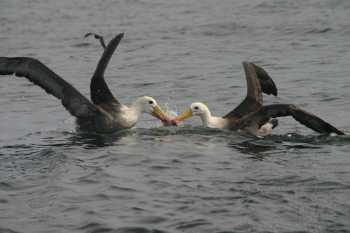The Fourth Session of the Meeting of the Parties (MoP4) to the Albatross and Petrel Agreement took place over 23-27 April 2012 in Lima, Peru. The meeting was opened with a welcome from the Vice-Minister of Fisheries, Patricia Majluf Chiok, on behalf of the Government of Peru. The report of the meeting is now available on the ACAP web site (click here).
The Fourth Session was attended by delegations from all 13 Parties to the Agreement and by observers from two range states (Canada and the USA) and from the Inter-American Convention for the Protection and Conservation of Sea Turtles (IAC), Organizacion Latinoamericana de Desarrollo Pesquero (OLDEPESCA), BirdLife International, the Chinese Wild Bird Federation (CWBF), and the World Wide Fund for Nature (WWF-New Zealand).
No new Parties had acceeded to ACAP since the last Meeting of Parties in 2011. Discussion was held on the accession to ACAP of member economies of the Asia-Pacific Economic Co-operation Forum (APEC) whose vessels fish within the range of albatrosses and petrels. It was agreed that this matter would be referred to an intersessional committee for further deliberation.
In its four days of deliberations MoP4 considered 24 Meeting Documents and seven Information Papers. Meeting Documents are available in all three ACAP official languages: English, French and Spanish, but Information Papers are not normally translated.
MoP4 unanimously approved of the nomination by Spain of the Balearic Shearwater Puffinus mauretanicus to the Agreement. The Balearic Shearwater, categorized as Critically Endangered by BirdLife International and the World Conservation Union (IUCN), breeds only in Spain's Balearic Islands in the Mediterranean. This is the first shearwater to be listed by ACAP, bringing the total number of species currently included within the Agreement to 30. To accompany its formal nomination, Spain prepared with the support of the ACAP Secretariat a Species Assessment text (MoP4 Inf 01 Rev 1) which summarises what is known about the shearwater's biology and what conservation threats it faces.
Following intersessional work led by New Zealand, MoP4 adopted a set of conservation priorities to be used as a guide to future work of ACAP and Parties to prioritise actions to achieve the objectives of the Agreement in the most effective way.

Waved Albatrosses occur in Peruvian waters
Photograph by Jeffery Mangel
The meeting adopted eight resolutions, included as Annexes to its report. These covered the Secretariat Work Programme for 2013 to 2015, staff regulations for the ACAP Secretariat, the Advisory Committee's work programme, financial regulations, the Agreement's budget for 2013 to 2015, and arrangements with international organisations.
The next formal meeting of ACAP, that of its Advisory Committee, is expected to take place in France in 2013. MoP4 closed with a vote of thanks to the Government of Peru for hosting the meeting.
John Cooper, ACAP Information Officer, 5 June 2012

 English
English  Français
Français  Español
Español